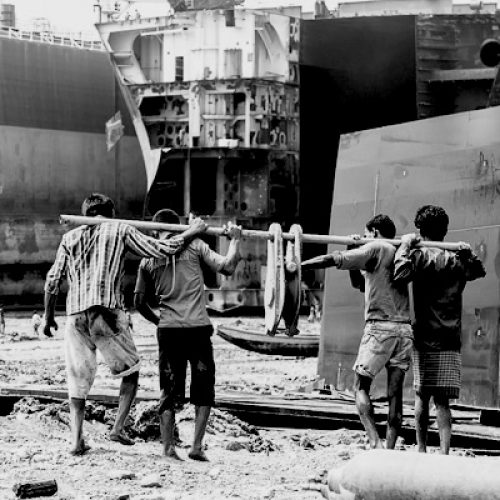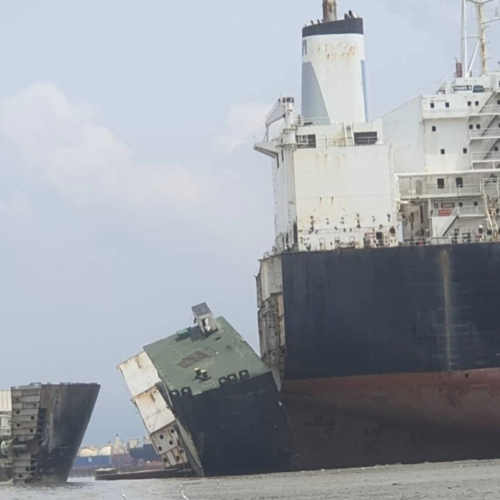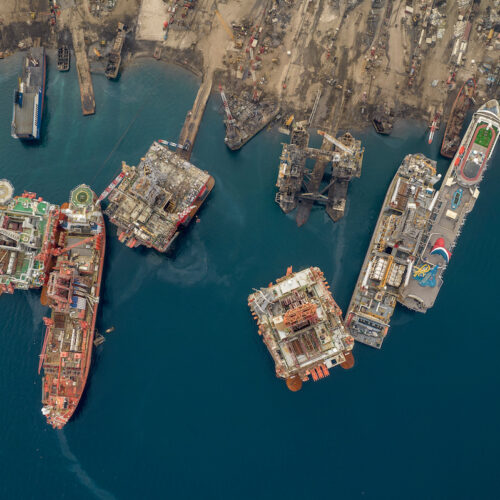Press Release – The Hong Kong Convention provides no roadmap for sustainable ship recycling
NGOs call upon the shipping sector to take responsibility and scale best practice
Today, the Hong Kong International Convention for the Safe and Environmentally Sound Recycling of Ships (HKC) officially enters into force. While the shipping industry and the International Maritime Organisation (IMO) have framed this as a landmark for safer and greener ship recycling, the NGO Shipbreaking Platform warns that the Convention fails to address the environmental injustice and human rights violations that continue to stain the industry.

The HKC does not prevent the most dangerous and polluting form of shipbreaking: the dismantling of end-of-life vessels on tidal mudflats, as practiced in countries like Bangladesh, India and Pakistan. This method, known as beaching, exposes workers to life-threatening risks and does not prevent hazardous materials - such as oil sludge and heavy metal laden paints - from contaminating fragile coastal ecosystems. By failing to prohibit beaching, the HKC rubberstamps a practice that has long been banned in all major ship owning countries [1] and which is excluded as an option for end-of-life management by responsible shipping companies [2].
The UN Special Rapporteur on Toxics and Human Rights and civil society groups globally already called out the HKC for its weak environmental standards and its silence on worker protection when the Convention was adopted in 2009. Since then, more than 100 beaching yards in India and Bangladesh have claimed that they operate in compliance with the HKC and received so-called Statements of Compliance with HKC from well-known classification societies. It says much about the low standard set by the IMO that facilities operating on a beach without infrastructure to contain pollutants, with no hospitals in the close vicinity, no capacity to safely dispose of hazardous materials and no track record of monitoring the health of their workers, supposedly fulfil the requirements of the HKC. Poor safety standards at these yards have caused numerous deaths and injuries - last year an explosion killed seven workers at a facility in Bangladesh that had obtained a so-called Statement of Compliance with HKC from Japanese classification society ClassNK.
The HKC’s reliance on defective flag-state control [3], its failure to impose binding labour and environmental protections, and its lack of downstream waste accountability means that ship owners can continue to operate with impunity, outsourcing the risks of dismantling to some of the world’s most vulnerable communities.
The NGO Shipbreaking Platform strongly denounces industry pressure to position the HKC as a substitute for existing, more robust legal instruments—most notably the Basel Convention, which restricts the global trade of hazardous waste and bans the dumping of toxic waste on developing countries. [4] While legal experts have outlined why the Basel Convention cannot be replaced by the HKC [5], governments must now support ways to ensure better enforcement of existing international environmental and labour laws and amend the HKC to bring it in line with these laws. Any move to side-line the Basel Convention in favour of the current weaker HKC framework would be a serious setback for global environmental governance and a betrayal of the communities who have borne the cost of this industry's failures for decades.

NOTES
[1] Beaching is banned in China, the EU, North America and the UAE recently adopted a new Regulation which also bans landing and will enter into force on 26 June.
[2] Last year the IOGP adopted new guidelines for recycling which exclude beaching as safe and environmentally sound. Companies such as Hapag-Lloyd and Walenius-Wilhelmsen have long had policies for not using beaching facilities. Petrobras is developing capacity to recycle its assets in dry-docks in Brazil, and very recently autoliner Hoegh announced an exciting new collaboration with AF Decom and Nordic Circles to up-cycle eight of their ships in Norway.
[3] The flags of St Kitts and Nevis, Comoros, Tuvalu and Mongolia are particularly popular for end-of-life vessels that end up in South Asia. Middle men scrap dealers known as cash buyers change the registry of the vessels to these flags just weeks before they hit the beach. These flag registries are black and grey listed by port authorities globally due to their poor implementation of maritime law.
[4] According to the World Bank, Bangladesh alone will have since 2010 imported 79.000 tons asbestos; 240.000 tons PCB containing cables; 240.000 tons Ozone Depleting Substances; 69.200 tons heavy metal laden paints from end-of-life vessels by 2030. Yet, Bangladesh has zero capacity to properly manage these toxic materials. Ships are being illegally imported to Bangladesh with fraudulent documents claiming that they are free of toxic materials.
[5] Both the Basel and HKC contain explicit conflict-resolution provisions, making it unnecessary to invoke general principles such as lex posteriori (a later treaty prevails) and lex specialis (a more specific treaty takes precedence). Legal experts have furthermore outlined why the HKC does not provide an ‘equivalent level of control’ to the Basel Convention - and thus fails to protect especially developing countries from the dumping of hazardous waste. As such the Basel Convention must remain fully applicable and cannot be displaced by the HKC.
Related news

Platform publishes South Asia Quarterly Update #16
There were a total of 220 ships broken in the second quarter of 2018. Of these, 169 ships were sold to the beaches of South Asia for… Read More

Press Release – Platform publishes list of ships dismantled worldwide in 2019
674 large ocean-going commercial vessels were sold to the scrap yards in 2019. Of these vessels, 469 were broken down on tidal mudflats in South Asia.
... Read More
Platform News – NGO Shipbreaking Platform awarded grant by Royal Academy of Engineering and Lloyd’s Register Foundation
Engineering X has awarded nearly £1 million in grants to projects aimed at tackling challenges of decommissioning ships and offshore structures.
... Read More
Platform News – ECSA’s Alang report turns a blind eye on problems of beaching method
The European Community Shipowners’ Association’s (ECSA) has published a report on their visit to the Alang shipbreaking yards in India last April. The NGO Shipbreaking Platform criticises… Read More

Platform News – Norway’s largest Pension Fund highlights human rights and environmental risks related to shipbreaking in South Asia
KLP, Norway’s largest pension fund [1], commissioned the International Law and Policy Institute (ILPI) [2] to write a report on the human rights and environmental risks related… Read More

Press Release – Accident on board Greek ship kills two and injures thirteen
Two deaths and thirteen severe injuries. This is the toll of victims following yet another accident at the shipbreaking beach of Chattogram, Bangladesh.
... Read More

